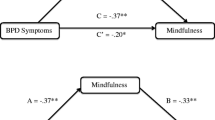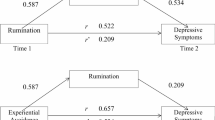The purpose of this study was to conduct a preliminary investigation into the cross-sectional associations between depression, rumination, and excessive reassurance-seeking. Guided by conceptual linkages between these variables, ruminative response style was examined as both a potential moderator and as a potential mediator of the association between depressive symptoms and excessive reassurance-seeking in a sample of undergraduate students (N=244). Results from this investigation suggest that rumination mediates, but does not moderate, the association between depression and excessive reassurance-seeking. Findings are discussed within the context of integrating cognitive and interpersonal perspectives within the study of depression.
Similar content being viewed by others
REFERENCES
Baron, R. M., & Kenny, D. A. (1986). The moderator-mediator variable distinction in social psychological research: Conceptual, strategic, and statistical considerations. Journal of Personality and Social Psychology, 51, 1173–1182.
Beck, A. T., Steer, R. A., & Brown, G. K. (1996). Beck Depression Inventory-II manual. San Antonio: Psychological Corporation.
Cohen, J. (1988). Statistical power analysis for the behavioral sciences (2nd ed.). Hillsdale, NJ: Lawrence Erlbaum Associates.
Coyne, J. C. (1976). Toward an interactional description of depression. Psychiatry, 39, 186–193.
Davila, J. (1999). Exploring alternative explanations for the association between depression and excessive reassurance-seeking. Psychological Inquiry, 10, 285–287.
Davila, J. (2001). Refining the association between excessive reassurance seeking and depressive symptoms: The role of related interpersonal constructs. Journal of Social and Clinical Psychology, 20, 538–559.
Gotlib, I. H., & Hammen, C. L. (1992). Psychological aspects of depression: Towards a cognitive–interpersonal integration. England: Wiley.
Jacobson, J. A., & Weary, G. (1999). The role of causal uncertainty in the reassurance-seeking–depression relation. Psychological Inquiry, 10, 288–290.
Joiner, T. E., Jr. (2000). Depression's vicious scree: Self-propagating and erosive processes in depressive chronicity. Clinical Psychology: Science and Practice, 7, 203–218.
Joiner, T. E., Jr., Alfano, M. S., & Metalsky, G. I. (1992). When depression breeds contempt: Reassurance-seeking, self-esteem, and rejection of depressed college students by their roommates. Journal of Abnormal Psychology, 101, 165–173.
Joiner, T. E., Jr., Alfano, M. S., & Metalsky, G. I. (1993). Caught in the crossfire: Depression, self-consistency, self-enhancement, and the response of others. Journal of Social and Clinical Psychology, 12, 113–134.
Joiner, T. E., Jr., & Metalsky, G. I. (2001). Excessive reassurance-seeking: Delineating a risk factor involved in the development of depressive symptoms. Psychological Science, 12, 371–378.
Joiner, T. E., Jr., Metalsky, G. I., Gencoz, F., & Gencoz, T. (2001). The relative specificity of excessive reassurance-seeking to depressive symptoms and diagnoses among clinical samples of adults and youth. Journal of Psychopathology and Behavioral Assessment, 23, 35–41.
Joiner, T. E., Jr., Metalsky, G. I., Katz, J., & Beach, S. R. H. (1999). Depression and excessive reassurance-seeking. Psychological Inquiry, 10, 269–278.
Joiner, T. E., Jr., & Schmidt, N. B. (1998). Excessive reassurance-seeking predicts depressive but not anxious reactions to acute stress. Journal of Abnormal Psychology, 107, 533–537.
Kenny, D. A., Kashy, D. A., & Bolger, N. (1998). Data analysis in social psychology. In D. Gilbert, S. T. Fiske, & G. Lindzey (Eds.), The handbook of social psychology (4th ed., Vol. 1, pp. 233–265). New York: McGraw-Hill.
Lyubomirsky, S., & Nolen-Hoeksema, S. (1995). Effects of self-focused rumination on negative thinking and interpersonal problem-solving. Journal of Personality and Social Psychology, 69, 176–190.
Minnix, J. A., Kline, J. P., Blackhart, G. C., Petit, J. W., Perez, M., & Joiner, T. E. (2004). Relative left-frontal activity is associated with increased depression in high reassurance-seekers. Biological Psychology, 67, 145–155.
Nolen-Hoeksema, S. (1991). Responses to depression and their effects on the duration of depressive episodes. Journal of Abnormal Psychology, 100, 569–582.
Nolen-Hoeksema, S. (2000). Further evidence for the role of psychosocial factors in depression chronicity. Clinical Psychology: Science and Practice, 7, 224–227.
Nolen-Hoeksema, S., & Davis, C. G. (1999). “Thanks for Sharing That”: Ruminators and their social support networks. Journal of Personality and Social Psychology, 77, 801–814.
Nolen-Hoeksema, S., & Morrow, J. (1991). A prospective study of depression and posttraumatic stress symptoms after a natural disaster: The 1989 Loma Prieta earthquake. Journal of Personality and Social Psychology, 61, 115–121.
Spasojevic, J., & Alloy, L. B. (2001). Rumination as a common mechanism relating depressive risk factors to depression. Emotion, 1, 25–37.
Ward, A., Lyubomirsky, S., Sousa, L., & Nolen-Hoeksema, S. (2003). Can't quite commit: Rumination and uncertainty. Personality and Social Psychology Bulletin, 29, 96–107.
Whisman, M. A., & McClelland, G. H. (2005). Designing, testing, and interpreting interactions and moderator effects in family research. Journal of Family Psychology, 19, 111–120.
Author information
Authors and Affiliations
Corresponding author
Rights and permissions
About this article
Cite this article
Weinstock, L.M., Whisman, M.A. Rumination and Excessive Reassurance-Seeking in Depression: A Cognitive–Interpersonal Integration. Cogn Ther Res 31, 333–342 (2007). https://doi.org/10.1007/s10608-006-9004-2
Published:
Issue Date:
DOI: https://doi.org/10.1007/s10608-006-9004-2




